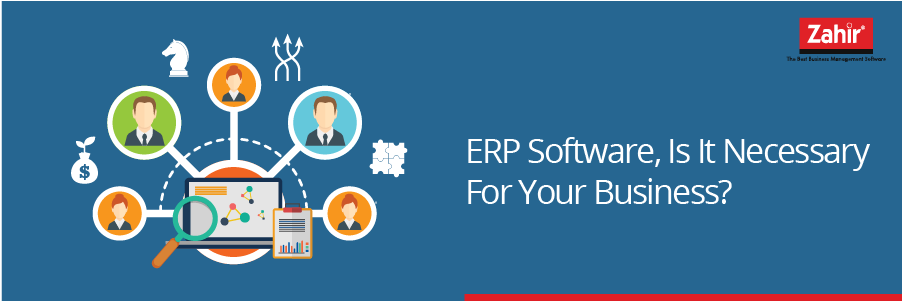The more advanced technology, the more encouraged businessmen to find the ways to maintain their businesses in the middle of the innovations flood. In order to achieve the innovation, an integrated business management system and latest system are required, like ERP. ERP (Enterprise Resource Planning) means Company Resource Planning. What kind of resources are planned? What is the relationship to business management? How does it work? And how to get that system? In this article we will explore ERP thoroughly and will certainly find the positive and negative correlation with your company’s investment.
ERP is the continuation of MRP (Manufacturing Resource Planning) system, where MRP is the evolution of the Material Requirement Planning that became the origin of ERP today. ERP system is not directly correspond to the customer, because the function is to support the back office, unlike front office software like point of sale. The back office business process includes the production process, purchasing, warehouse, distribution, procurement, inventory, bank reconciliation, and other matters relate to accounting record process. In short, ERP is an integrated accounting software for back office.
In accordance with managing business, ERP software is closely related to the financial management and crucial for the business. Like a car which must have machine and run by the driver. ERP can be called as the company machine in which all business processes are entered, recorded, processed, and automatically generated the information needed to take business decisions.
The, how exactly the modular parts in the system? Most of these back office systems are divided into 3 main modules, namely accounting and finance module, operational module, and human resource module. The details are described as follows:
- Accounting and Finance Module. This module is used for all events in the financial division such as general accounting records, cash and bank management, corporate investment planning, financial analysis, etc.
- Operational Module. Based on its name, this module is used for company operational activities such as purchasing, production process, distribution, inventory management, quality control, debt management and accounts receivable, etc.
- Human Resource Module. It facilitates the Human Resource Department in controlling company’s human resources, because the system accommodates payroll recording, skills development training, and any other activities related to HR management.
Of the three aspects of the modular, it shows the simplicity of the implemented business management in an integrated system based on their respective parts. Here are the benefits to be gained:
- Financial supervision by the top management can be easily performed because all records of financial data are integrated by the system and directly present information in the form of financial statements.
- The operational procedure standardization. This standardization allows each flow of operational activity to be well-organized in order to minimize the risk of human error and time efficiency.
- Uniformity of financial records and accounting principles. For large companies with many branches can synchronize the applied accounting, whether it is inventory method, accounting base, cash flow method, and others.
After recognizing the benefits of ERP software, now we must also recognize the types of ERP software in the market. What steps should the company consider to choose?. In general, ERP software has been widely marketed by various companies both local and international. The existing ERP software consists of 2 different provisions, Fixed Software and Customized Software (Modification).
Fixed Software
This software is made based on the field research. This research allows the software provider to make the packaged edition suitable for various fields from micro, small, medium, to large scale. Companies or employees whose task is related to accounting can select the suitable edition or closely to their business flow. Before selecting the software, the company is recommended to discuss it first with the software provider’s consulting team. Having consultation prior the software purchase is to ensure your company will implement the proper software package. Since this software is fixed, without any possibilities to modify it, but open the possibility to upgrade facilities, then after-sales service should be assured, such as training and assistance, either free or paid. The software provider provides training services to make users can learn, understand, and get familiar with software procedure.
The software target market is not limited to big company only, but also educational institutions, services, non-profit, small-scaled companies, even household bookkeeping implement it. This is why fixed ERP software has became most companies’ interest considering its simplicity, quick implementation, and after sales guarantee service. This software can also be referred to as semi-ERP software
Customized Software
As its name, this software is made based on company’s request. The existing software is not available. The software developer will create the ERP software when its prospectus company decides to order it. Since the software is made based on the request, there are some stages taken to decide the software is the compatible one. The steps are as follows:
- Prepare detailed data regarding to the business flow, consists of at least 3 main lines of operational activities, financial and accounting activities, and human resource department activities (HRD).
- Consider whether the step of using this customized ERP software enable to develop the company’s performance and including its projections.
- Consider if the business owner or human resources have the capability of ERP implementation
- Consider the expenses spent on this customized ERP software.
- Select reliable, trustworthy, and experienced software developer
- Consult point 1 – 5 to the selected provider
These are the 6 main points to go although though there may be some other additional points. From the above description, you may get impression that this ERP only applicable for large scaled enterprises only. This can be true. ERP implementation is a big fund investment, takes months and even years in order to start implementation (this is just the early stage).
The obstacles encountered to start the implementation of customized ERP software are as follows:
A. An expensive investment because customized ERP is a software that can be modified based on the company needs
B. There is no guarantee that the implementation runs successfully, though in other companies the implementation may run properly.
C. Since this software is made based on the company operational flow, it will take more times to settle it. It may take months or years because the developer must test the software first and make sure it is bugs free. The length software development and implementation is one of the reasons why this software price is high.
D. Continual employees training is required
E. The high cost of after sales service and maintenance mostly paid in advance for specified period.
Therefore, ERP software investment must be started by learning the previous experience from previous successors along with appropriate planning methods. Recognizing your business scale and identify the business needs are the best recommended steps.




